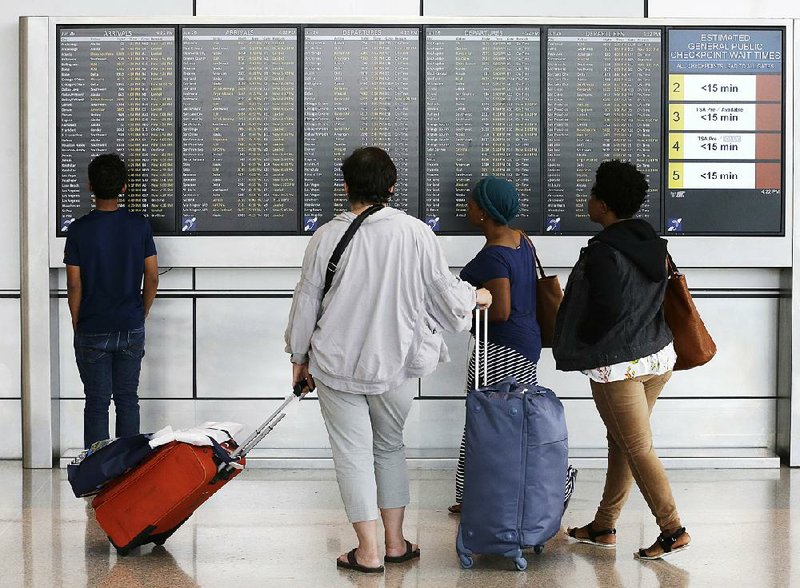WASHINGTON -- President Donald Trump's administration expects to move forward Thursday with a limited version of its travel ban on six mostly Muslim countries, but it has yet to say how it will implement the order or avoid the chaos that accompanied the initial ban.
Government lawyers were working on guidelines Tuesday, a day after the Supreme Court partially reinstated the ban ahead of hearing arguments in October. The court said the administration can block travelers from Syria, Sudan, Somalia, Libya, Iran and Yemen unless they can prove a "bona fide relationship" with a person or entity in the United States.
The court offered only broad guidelines about what would constitute such a relationship -- suggesting it would include a close relative, a job offer or an invitation to lecture.
The court ordered similar limitations on Trump's plan to temporarily halt all refugee admissions. But that may have minimal effect for now. Of the 50,000 refugees the government planned to accept in the current budget year, more than 48,900 have been allowed to enter the U.S.
[TRUMP: Timeline of president-elect’s career + list of appointments so far]
The State Department has said that the few remaining refugees to be admitted this year will not have to prove a "bona fide relationship." A new cap won't be in place until the start of the budget year in October, around the time the Supreme Court considers the case.
Trump ordered the refugee ban and a travel ban affecting the six countries, plus Iraq, shortly after taking office in January. He said it was needed to protect the U.S. from terrorists, but opponents said it was unfairly harsh and was intended to meet Trump's campaign promise of keeping Muslims out of the United States.
After a federal judge struck down the bans, Trump signed a revised order intended to overcome legal hurdles. That order, which removed Iraq, was also struck down by lower courts. The Supreme Court's action Monday partially reinstated the effort.
The initial order created confusion as the Trump administration scrambled to make changes amid backlash as legal U.S. residents, refugees and holders of valid visas were denied boarding at foreign airports or detained and sent back overseas after landing in the United States.
With the uncertainty surrounding the Supreme Court's order, immigration advocates and civil-rights lawyers are ready for possible legal challenges.
Shortly after the court's ruling, the State Department notified all U.S. diplomatic posts of the decision and advised them to await instructions that would be forthcoming by the self-imposed implementation deadline on Thursday, according to officials familiar with the situation.
Until the new guidance is complete, posts are to process applications as they had been previously, according to the officials, who spoke on condition of anonymity because they were not authorized to discuss internal communications publicly.
It remained unclear exactly when new instructions would be distributed to embassies and consulates. Among other questions lawyers were grappling with were the intent of the executive order and how specific the instructions should be in interpreting what constitutes a "bona fide relationship."
A broad interpretation, for example, could allow for a contract or reservation with a rental car agency or hotel in the United States to be considered a legitimate relationship, the officials said.
Similarly, an applicant's relationship with a distant, nonblood relative in the U.S. could be considered legitimate. The officials said the new guidance might not delve into such specifics and might instead leave consular officers with discretion to make their own determinations.
The Homeland Security Department, whose officials help vet visa applicants and decide which arriving foreigners are ultimately allowed into the country, has said only that it will implement the travel ban "professionally, with clear and sufficient public notice."
The union that represents Customs and Border Protection agents said Tuesday that it wants the administration to provide detailed guidance to help avoid a repeat of the chaos that ensued in January.
"I said in January that it would have been better if the agency would have done more advanced planning before the original ban took effect, so we hope such confusion can be avoided this time," said Tony Reardon, president of the National Treasury Employees Union.
A Section on 06/28/2017
